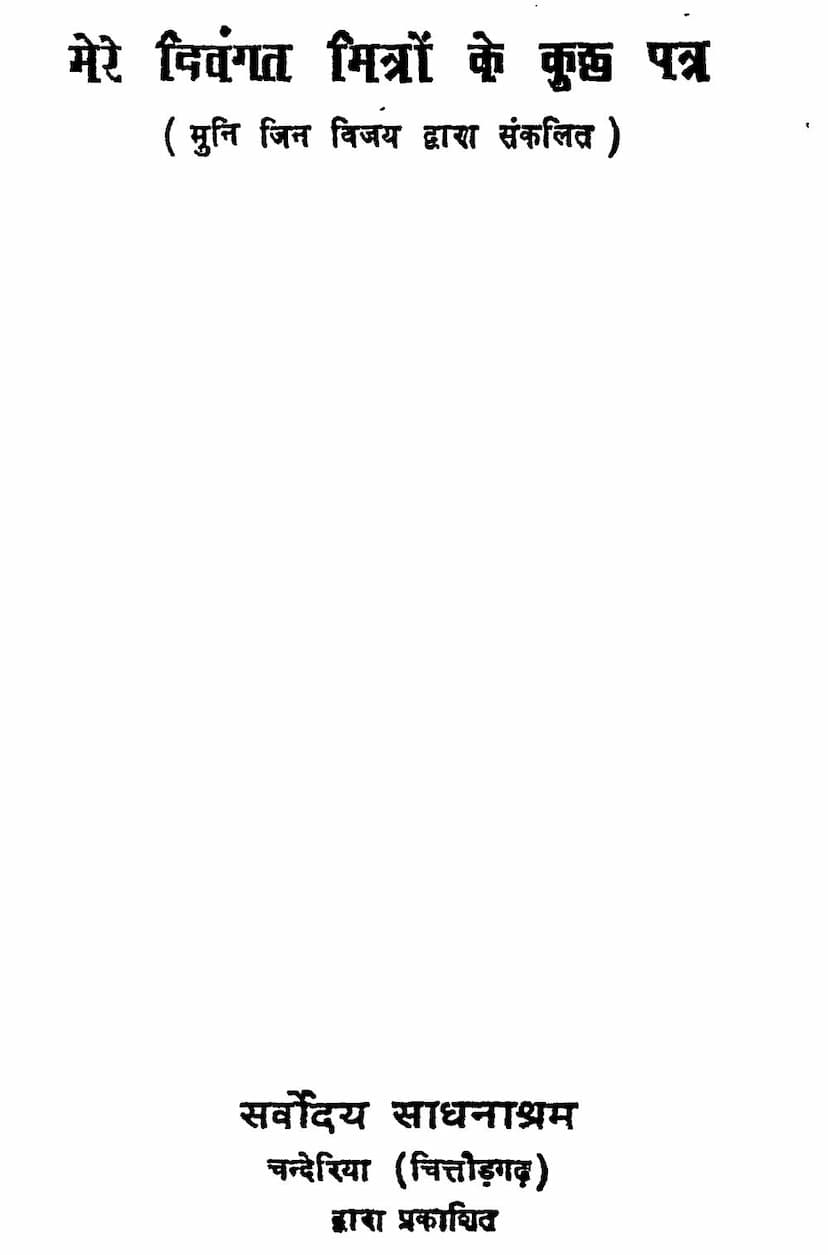Mere Divangat Mitro Ke Kuch Patra
Added to library: September 2, 2025

Summary
Here's a comprehensive summary of the Jain text "Mere Divangat Mitro ke Kuch Patra" (Some Letters of My Departed Friends), compiled by Muni Jinvijay:
Book Title: Mere Divangat Mitro ke Kuch Patra (Some Letters of My Departed Friends) Author: Muni Jinvijay Publisher: Sarvoday Sadhnashram Chittorgadh Publication Date: 1972
Overall Purpose: This book is a collection of letters from various learned and notable individuals who were departed friends of the compiler, Muni Jinvijay. The primary purpose of this collection is to preserve the intellectual and personal correspondence of these individuals, offering insights into their lives, thoughts, literary pursuits, and their interactions with Muni Jinvijay. It serves as a testament to the compiler's connections and the intellectual landscape of the time.
Compiler's Background and Literary Journey (as described in the preface): Muni Jinvijay, in his preface, shares his unconventional educational path. He received no formal schooling but gained literacy through a dedicated guru. His early interests were in ancient texts, history, and archaeology. He underwent a spiritual transformation, changing his religious sect in 1908, which exposed him to printed books and sparked a deep interest in literature, particularly the Hindi magazine 'Saraswati'. This exposure fueled his desire to write and contribute to intellectual discourse. He describes his journey of self-education and his growing engagement with various scholarly and literary circles. The compiler emphasizes that his correspondence is primarily with learned individuals, and this collection represents a small sample of the hundreds of letters he possesses.
Key Themes and Content:
- Intellectual Exchange and Friendship: The core of the book is the exchange of letters between Muni Jinvijay and his friends. These letters reveal deep intellectual discussions, shared academic interests, and a bond of mutual respect and affection.
- Preservation of Intellectual Heritage: The compiler's motivation is to preserve the valuable contributions and thoughts of his departed friends, many of whom were prominent scholars, writers, and public figures.
- Literary and Historical Pursuits: Many of the letters discuss literary projects, the publication of books and journals, archaeological findings, historical research, and the interpretation of ancient texts and inscriptions.
- Personal Reflections and Life Events: Alongside scholarly matters, the letters also touch upon personal well-being, travel, health, and significant life events, offering a glimpse into the personal lives of these individuals.
- Jainism and Cultural Contributions: A significant portion of the correspondence relates to Jainism, its literature, history, philosophy, and the efforts to promote and preserve Jain heritage. Many of the individuals featured were actively involved in Jain scholarly pursuits or supported such endeavors.
- The Role of 'Saraswati' Magazine: The compiler highlights the impact of the 'Saraswati' magazine in his literary awakening and his subsequent correspondence with its esteemed editor, Pandit Mahavir Prasad Dwivedi.
- Efforts in Language and Education: The letters also reflect on the development and promotion of the Hindi language and the broader goals of education and cultural upliftment.
Prominent Correspondents and Their Contributions (as detailed in the preface):
The book features letters from eleven distinguished individuals. Each correspondent is briefly introduced, highlighting their background and connection to Muni Jinvijay:
- Shri Rajkumar Singh Ji (Calcutta): Involved in the establishment of the Bhandarkar Oriental Research Institute and active in Jain community affairs.
- Late Kumar Shri Devendra Prasad Jain: A young, enthusiastic scholar with a strong interest in Jain history and literature, who contributed to the Jain Literature Research Society.
- Shri Kesari Chand Ji Bhandari (Indore): A social worker and follower of the Sthanakvasi sect, interested in Jain society's progress, literature, and philosophy.
- Babu Shri Pooranchand Ji Nahar (Calcutta): A wealthy, learned, and influential figure, lawyer, and social leader, with a keen interest in Jain history, literature, and art. He actively supported Muni Jinvijay's academic pursuits.
- Late Rai Bahadur, Mahamahopadhyaya Pt. Shri Gaurishankar Hirachand Ojha: A world-renowned scholar and Rajasthan's foremost historian, whose writings were instrumental in Muni Jinvijay's early historical studies.
- Late Babu Shri Kashiprasad Jaiswal (Patna): A prominent archaeologist and writer, known for his extensive research on ancient Indian history, particularly on the Kharvel inscription.
- Late Dr. Hirananad Shastri (Punjab): An eminent epigraphist and archaeologist, who worked in the Department of Archaeology and collaborated with Muni Jinvijay on ancient Jain inscriptions.
- Late Pt. Mahavir Prasad Ji Dwivedi: A great proponent of the Hindi language and the esteemed editor of 'Saraswati' magazine, who played a pivotal role in nurturing Muni Jinvijay's literary career.
- Late Shri Tarachand Rai (Germany): A patriot and an ardent devotee of Indian culture living in Germany, who was also a proponent of the Hindi language.
- Late Swami Shri Satyadev Ji: A devoted advocate of Hindi, a patriot, and an enthusiastic wanderer, who was also a key supporter of the Non-Cooperation Movement.
- Late Mahapandit Rahul Sankrityayan: A world-famous scholar of Buddhist literature and a renowned Hindi writer, known for his revolutionary ideas and profound scholarship.
Significance of the Collection:
- Historical Document: The book serves as a historical document, preserving the correspondence of significant figures and reflecting the intellectual currents of early 20th-century India.
- Biographical Insights: It offers valuable biographical insights into Muni Jinvijay's life and his extensive network of intellectual companions.
- Scholarly Value: The letters contain discussions on important academic topics, shedding light on research methodologies, the state of scholarship at the time, and the challenges faced by researchers.
- Inspiration for Future Generations: The compiler hopes that this collection will inspire future generations of scholars and readers by showcasing the dedication and intellectual curiosity of his friends.
In essence, "Mere Divangat Mitro ke Kuch Patra" is more than just a collection of letters; it is a curated repository of intellectual exchange, personal friendships, and a deep commitment to the preservation and promotion of knowledge, particularly within the Jain tradition and the broader context of Indian intellectual history.